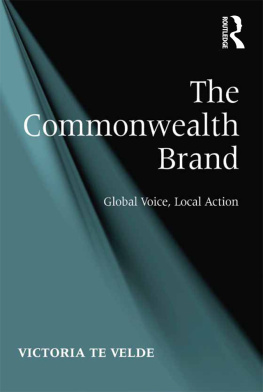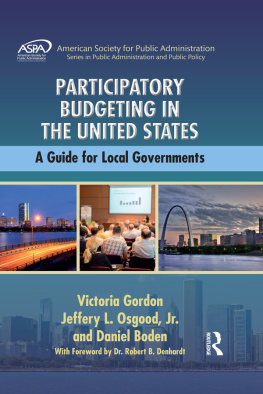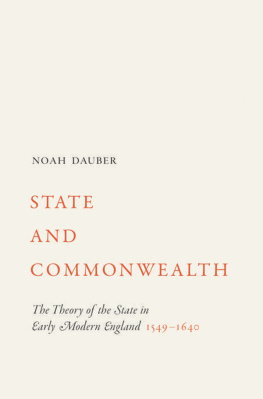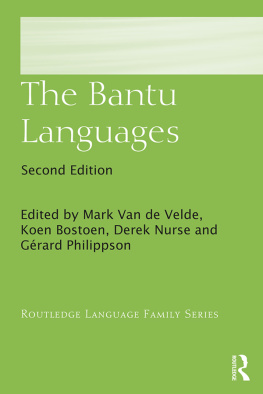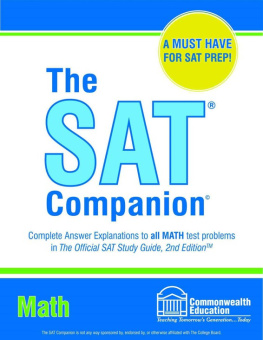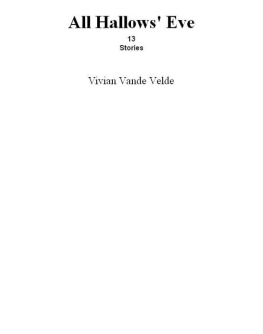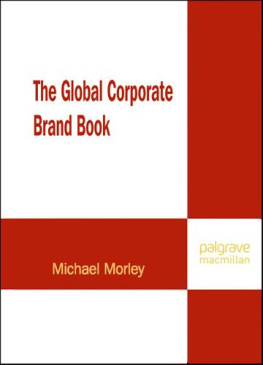First published 2011 by Ashgate Publishing
Published 2016 by Routledge
2 Park Square, Milton Park, Abingdon, Oxon OX14 4RN
711 Third Avenue, New York, NY 10017, USA
Routledge is an imprint of the Taylor & Francis Group, an informa business
Copyright 2011 Victoria te Velde.
Victoria te Velde has asserted her right under the Copyright, Designs and Patents Act, 1988, to be identified as the author of this work.
All rights reserved. No part of this book may be reprinted or reproduced or utilised in any form or by any electronic, mechanical, or other means, now known or hereafter invented, including photocopying and recording, or in any information storage or retrieval system, without permission in writing from the publishers.
Notice:
Product or corporate names may be trademarks or registered trademarks, and are used only for identification and explanation without intent to infringe.
British Library Cataloguing in Publication Data
Velde, Victoria te.
The Commonwealth brand : global voice, local action.
1. Commonwealth (Organization)--Membership.
2. Commonwealth countries. 3. Commonwealth countries-
Politics and government. 4. Commonwealth countries-
Relations. 5. Commonwealth countries--Case studies.
I. Title
909'.0971241-dc22
Library of Congress Cataloging-in-Publication Data
te Velde, Victoria.
The commonwealth brand : global voice, local action / by Victoria te
Velde.
p. cm.
Includes bibliographical references and index.
ISBN 978-1-4094-2917-3 (hbk) -- ISBN 978-1-4094-2918-0 (ebk)
1. Cultural pluralism. 2. International cooperation. 3.
International relations. I. Title.
HM1271.T4 2011
305.8009171'241--dc23
2011019347
ISBN 978-1-409-42917-3 (hbk)
ISBN 978-1-315-61488-5 (ebk)
Preface
This book examines the evolution of Commonwealth membership and identity, and the related issues of enlargement. We identify and discuss the different theoretical international relations approaches to analysing the Commonwealth. In so doing we expose various shortcomings in current thinking about international relations and the Commonwealth. Most analysis tends to be state-centric and fails to sufficiently incorporate the wide range of actors now active on the global scene, including the Commonwealth. Global governance is shown to be an appropriate framework for analysing the Commonwealth in the twenty-first century, because it incorporates current issues such as globalisation and the role of non-state actors.
We reveal how a number of turning points in the organisations history have shaped its membership rules. The most recent of these was Mozambiques accession in 1995 and Rwandas in 2009. A tightening of the membership criteria followed, which ruled out a number of applicants. Nevertheless, we also show that the official Commonwealth still has the legal potential to expand. We examine the cases of a number of eligible states and assess their likelihood of achieving membership. We also analyse the case of a handful of non-eligible states that, notwithstanding the new rules', are still bent on joining.
Despite its traditional image, Commonwealth membership is shown to be a rather fluid concept that evolves with the times. The implications of this are that it should be regarded as a more open organisation than most analysts currently assume. Moreover, Commonwealth civil society organisations now play a greater role in influencing membership, both through their advocacy work and at the policy-making table. The informal Commonwealth, with its global networks of professionals, is growing in strength and reach. Thus, we see both top-down and bottom-up activity that may yet lead to the further expansion of the modern Commonwealths.

